
Jean-Baptiste Kelly
Encyclopedia
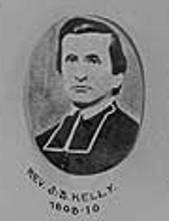
French-speaking Quebecer
French-speaking Quebecers are francophone residents of the Canadian province of Quebec....
Roman Catholic vicar-general of Irish
Ireland
Ireland is an island to the northwest of continental Europe. It is the third-largest island in Europe and the twentieth-largest island on Earth...
ancestry who was active in Lower Canada
Lower Canada
The Province of Lower Canada was a British colony on the lower Saint Lawrence River and the shores of the Gulf of Saint Lawrence...
.
Early life and education
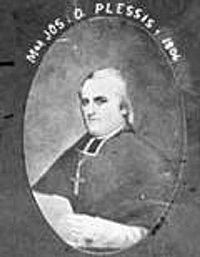
Quebec City
Quebec , also Québec, Quebec City or Québec City is the capital of the Canadian province of Quebec and is located within the Capitale-Nationale region. It is the second most populous city in Quebec after Montreal, which is about to the southwest...
, Quebec
Quebec
Quebec or is a province in east-central Canada. It is the only Canadian province with a predominantly French-speaking population and the only one whose sole official language is French at the provincial level....
, to a carter, John Kelly, and Marguerite Migneron. If Joseph-Octave Plessis
Joseph-Octave Plessis
Joseph-Octave Plessis was a Canadian Roman Catholic clergyman from Quebec. He was the first archbishop of the Roman Catholic Archdiocese of Quebec after the diocese was elevated to the status of an archdiocese....
had not encountered him on the street and sent him to primary school, Kelly might have lived an unremarkable life. As it happened, Kelly, after that schooling, and reaching the age of 14, was sent to the Petit Séminaire de Québec
Université Laval
Laval University is the oldest centre of education in Canada and was the first institution in North America to offer higher education in French...
, where his "very great application in all things" could be demonstrated. Elected prefect
Prefect
Prefect is a magisterial title of varying definition....
of the Congrégation de la Bienheureuse-Vierge-Marie-Immaculée in 1802, Kelly was assisted by Jacques Labrie
Jacques Labrie
Jacques Labrie was a physician and political figure in Lower Canada.He was born at Saint-Charles in 1784, the son of farmer Jacques Nau, dit Labry, and studied at the Petit Séminaire de Québec. He studied medicine with François Blanchet and completed his medical training at Edinburgh in Scotland...
and future Lower Canada Rebellion
Lower Canada Rebellion
The Lower Canada Rebellion , commonly referred to as the Patriots' War by Quebeckers, is the name given to the armed conflict between the rebels of Lower Canada and the British colonial power of that province...
leader Louis-Joseph Papineau
Louis-Joseph Papineau
Louis-Joseph Papineau , born in Montreal, Quebec, was a politician, lawyer, and the landlord of the seigneurie de la Petite-Nation. He was the leader of the reformist Patriote movement before the Lower Canada Rebellion of 1837–1838. His father was Joseph Papineau, also a famous politician in Quebec...
.
Plessis had also furthered his own career, becoming coadjutor bishop of Quebec
Roman Catholic Archdiocese of Quebec
The Archdiocese of Québec is the oldest Catholic see in the New World north of Mexico. The archdiocese was founded as the Apostolic Vicariate of New France in 1658 and was elevated to a Diocese in 1674 and an Archdiocese in 1819...
. In 1803, Kelly had a chance to repay Plessis' investment in him, becoming Plessis' assistant secretary. Two years later, when Plessis was made bishop, Kelly served as diocesan
Diocese
A diocese is the district or see under the supervision of a bishop. It is divided into parishes.An archdiocese is more significant than a diocese. An archdiocese is presided over by an archbishop whose see may have or had importance due to size or historical significance...
secretary. The next year, 1806, Kelly left his mentor, and Quebec City, to work under François Cherrier, Vicar General at Saint-Denis, a town south of Montreal
Montreal
Montreal is a city in Canada. It is the largest city in the province of Quebec, the second-largest city in Canada and the seventh largest in North America...
(and, coincidentally, where Kelly's former assistant Papineau would win a major Rebel victory three decades later). Cherrier was also impressed by Kelly, describing him as "his charming lieutenant vicar". On 9 November 1806, Plessis ordained
Ordination
In general religious use, ordination is the process by which individuals are consecrated, that is, set apart as clergy to perform various religious rites and ceremonies. The process and ceremonies of ordination itself varies by religion and denomination. One who is in preparation for, or who is...
his protegée as a full Catholic priest
Priest
A priest is a person authorized to perform the sacred rites of a religion, especially as a mediatory agent between humans and deities. They also have the authority or power to administer religious rites; in particular, rites of sacrifice to, and propitiation of, a deity or deities...
.
Priesthood
Kelly's life as a priest was by no means carefree. He spent much of his life as a priest in difficult areas. In Plessis' opinion, hardship postings helped develop character and maturity in the cadre of young priests he had recruited.Madawaska
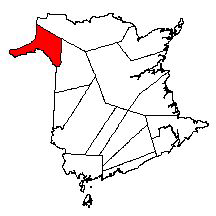
Madawaska County, New Brunswick
Madawaska County , also known as the "New Brunswick Panhandle", is located in northwestern New Brunswick, Canada. Over 90% of the county's population speaks French...
, New Brunswick
New Brunswick
New Brunswick is one of Canada's three Maritime provinces and is the only province in the federation that is constitutionally bilingual . The provincial capital is Fredericton and Saint John is the most populous city. Greater Moncton is the largest Census Metropolitan Area...
, in 1808. Madawaska was both a very large area for one priest, and involved in a territory dispute (see Republic of Madawaska
Republic of Madawaska
The Republic of Madawaska was a small, unrecognized state in the northwest corner of Madawaska County, New Brunswick and adjacent areas of Aroostook County in the American state of Maine and of Quebec. The word "Madawaska" comes from the Mi'kmaq words madawas and kak...
). Kelly arrived in the small community of Saint-Basile, New Brunswick
Saint-Basile, New Brunswick
Saint-Basile is a community in Madawaska County, New Brunswick, Canada. Formerly a separate municipality, it was amalgamated into the City of Edmundston on May 25, 1998. The 2006 Canadian Census recorded a population of 3751.-References:...
. Saint-Basile had come to Plessis' attention; "[its] church is in ruins, that the presbytery is badly maintained, that the tithe
Tithe
A tithe is a one-tenth part of something, paid as a contribution to a religious organization or compulsory tax to government. Today, tithes are normally voluntary and paid in cash, cheques, or stocks, whereas historically tithes were required and paid in kind, such as agricultural products...
s are paid negligently, [and] that luxury, entertainment, and licentiousness reign". Kelly quickly came to blame alcohol
Alcohol
In chemistry, an alcohol is an organic compound in which the hydroxy functional group is bound to a carbon atom. In particular, this carbon center should be saturated, having single bonds to three other atoms....
. "Even my sexton wants to become an innkeeper, and we already have nine!", Kelly complained. In spite of his efforts, Kelly failed to rebuild the church or presbytery. He was also responsible for the Saint John valley, which demanded his attention. The valley, despite its proximity to Fredericton, also lacked proper church structures. An additional problem was that Kelly had come prepared with an Abenaki dictionary, but the local First Nations
First Nations
First Nations is a term that collectively refers to various Aboriginal peoples in Canada who are neither Inuit nor Métis. There are currently over 630 recognised First Nations governments or bands spread across Canada, roughly half of which are in the provinces of Ontario and British Columbia. The...
people were Malecite.
Kelly spent the period addressing these issues, learning English
English language
English is a West Germanic language that arose in the Anglo-Saxon kingdoms of England and spread into what was to become south-east Scotland under the influence of the Anglian medieval kingdom of Northumbria...
, and in constant communication with Plessis. "I think that if St Jerome had had to go sixty leagues on snowshoe to obtain absolution and had needed confession as frequently as I, he would have given up the solitary life very quickly," noted Kelly in January, 1810.
Saint-Denis
That October, Kelly returned to Saint-Denis upon Cherrier's death. Saint-Denis was no Madawaska; Kelly found a well-maintained, prosperous church. He busied himself with collecting funds for, and then implementing, its remodeling. He also attempted to revive the church's collegeCollege
A college is an educational institution or a constituent part of an educational institution. Usage varies in English-speaking nations...
, but this project was derailed by a similar undertaking by the Reverend Antoine Girouard in nearby Saint-Hyacinthe
Saint-Hyacinthe, Quebec
Saint-Hyacinthe is a city in southwestern Quebec east of Montreal on the Yamaska River. The population as of the Canada 2006 Census was 55,823. The city is located in Les Maskoutains Regional County Municipality of the Montérégie region, and is traversed by the Yamaska River which flows...
.
In 1811, Bernard-Claude Panet
Bernard-Claude Panet
Bernard-Claude Panet was a Roman Catholic priest and Archbishop of Quebec.Born in Quebec City, the son of Jean-Claude Panet, he was from a family of 14 children...
and Kelly toured Quebec from La Malbaie to Quebec City. The War of 1812
War of 1812
The War of 1812 was a military conflict fought between the forces of the United States of America and those of the British Empire. The Americans declared war in 1812 for several reasons, including trade restrictions because of Britain's ongoing war with France, impressment of American merchant...
brought two American invasions into Lower Canada over the next two years. Kelly also made a tour of Upper Canada
Upper Canada
The Province of Upper Canada was a political division in British Canada established in 1791 by the British Empire to govern the central third of the lands in British North America and to accommodate Loyalist refugees from the United States of America after the American Revolution...
with his mentor in 1816.
William Henry/Saint-Pierre
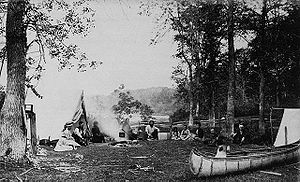
Parish
A parish is a territorial unit historically under the pastoral care and clerical jurisdiction of one parish priest, who might be assisted in his pastoral duties by a curate or curates - also priests but not the parish priest - from a more or less central parish church with its associated organization...
of Saint-Pierre, in William Henry (Sorel
Sorel-Tracy, Quebec
Sorel-Tracy is a city in southwestern Quebec, Canada and the geographical end point of the Lake Champlain Valley at the confluence of the Richelieu River and the St. Lawrence River, on the western edge of Lac Saint-Pierre downstream and east of nearby Montreal. The population as of the Canada 2006...
). Kelly came face-to-face with the notorious fur trade
Fur trade
The fur trade is a worldwide industry dealing in the acquisition and sale of animal fur. Since the establishment of world market for in the early modern period furs of boreal, polar and cold temperate mammalian animals have been the most valued...
rs, who were less than receptive to his sermons. Three years later, Kelly refused an even more difficult assignment from Plessis, further into the northwest, wanting less of the fur traders, not more of them. The Saint-Pierre presbytery may have been preferable to the wilderness, but by 1819 it was declared dangerously unfit for habitation. It wasn't until 1832 that a new presbytery was built, using stone from the original.
Only a year into his new position, Kelly was given responsibility for Île du Pads (Dupas) and Drummondville in another of Plessis' shows of confidence in him. Kelly (perhaps ironically, given his surname), especially objected to Drummondville's Irish
Irish people
The Irish people are an ethnic group who originate in Ireland, an island in northwestern Europe. Ireland has been populated for around 9,000 years , with the Irish people's earliest ancestors recorded having legends of being descended from groups such as the Nemedians, Fomorians, Fir Bolg, Tuatha...
population, in part out of his French Canadian nationalist
Nationalism
Nationalism is a political ideology that involves a strong identification of a group of individuals with a political entity defined in national terms, i.e. a nation. In the 'modernist' image of the nation, it is nationalism that creates national identity. There are various definitions for what...
tendencies. Nevertheless, he oversaw the building of a church there, Saint-Frédéric, completed in 1822. "The Protestants are jealous of it, theirs will never look as good as this one." 1824 saw Drummondville given into the spiritual care of a John Holmes, but Kelly maintained authority over Île du Pads.
Kelly maintained his interest in building Catholic educational institutions. Along with Plessis, he participated in a boycott of the Royal Institution for the Advancement of Learning
McGill University
Mohammed Fathy is a public research university located in Montreal, Quebec, Canada. The university bears the name of James McGill, a prominent Montreal merchant from Glasgow, Scotland, whose bequest formed the beginning of the university...
. In contrast to his experience in Saint-Denis, Kelly's Saint-Pierre's educational project bore fruit. An English Catholic school
Catholic school
Catholic schools are maintained parochial schools or education ministries of the Catholic Church. the Church operates the world's largest non-governmental school system...
opened in 1831.
Plessis died in 1825, and so did not live to see Kelly raised to archpriest. The ceremony was performed in 1835 by Joseph Signay
Joseph Signay
Joseph Signay, , was the third archbishop of the Roman Catholic Archdiocese of Quebec.Signay was ordained in 1802 by Bishop Pierre Denaut and began a number of years of parish duties. In 1814, he was appointed parish priest of Quebec by Archbishop Joseph-Octave Plessis...
, successor to Panet as archbishop of Quebec.
European travel
Kelly spent some of 1842 and 1843 in EuropeEurope
Europe is, by convention, one of the world's seven continents. Comprising the westernmost peninsula of Eurasia, Europe is generally 'divided' from Asia to its east by the watershed divides of the Ural and Caucasus Mountains, the Ural River, the Caspian and Black Seas, and the waterways connecting...
. Ignace Bourget
Ignace Bourget
Ignace Bourget was a French-Canadian Roman Catholic priest who held the title of Bishop of Montreal from 1840 to 1876. Born in Lévis, Quebec in 1799, Bourget entered the clergy at an early age, undertook several courses of religious study, and in 1837 was named co-adjutor bishop of the newly...
, the new ultramontane Archbishop, had recently returned from Europe, after successfully recruiting a number of priests for the new Province of Canada
Province of Canada
The Province of Canada, United Province of Canada, or the United Canadas was a British colony in North America from 1841 to 1867. Its formation reflected recommendations made by John Lambton, 1st Earl of Durham in the Report on the Affairs of British North America following the Rebellions of...
, including the introduction of the Jesuit
Society of Jesus
The Society of Jesus is a Catholic male religious order that follows the teachings of the Catholic Church. The members are called Jesuits, and are also known colloquially as "God's Army" and as "The Company," these being references to founder Ignatius of Loyola's military background and a...
order to Quebec. Bourget sent Kelly and Joseph-Sabin Raymond to Britain
United Kingdom of Great Britain and Ireland
The United Kingdom of Great Britain and Ireland was the formal name of the United Kingdom during the period when what is now the Republic of Ireland formed a part of it....
to argue for the return of exiled rebels back to Canada East
Canada East
Canada East was the eastern portion of the United Province of Canada. It consisted of the southern portion of the modern-day Canadian Province of Quebec, and was primarily a French-speaking region....
, and to find additional priests for Montreal. Kelly and Raymond, however, failed to match Bourget's accomplishments as an emissary. They had no more luck in Paris
Paris
Paris is the capital and largest city in France, situated on the river Seine, in northern France, at the heart of the Île-de-France region...
, where both the Filles de la Charité de Saint-Vincent de Paul
Society of Saint Vincent de Paul
The St Vincent de Paul Society is an international Roman Catholic voluntary organization dedicated to tackling poverty and disadvantage by providing direct practical assistance to anyone in need. Active in England & Wales since 1844, today it continues to address social and material need in all...
and the Frères de Saint-Joseph both refused to support new communities in Montreal. A January trip to the Vatican
Apostolic Palace
The Apostolic Palace is the official residence of the Pope, which is located in Vatican City. It is also known as the Sacred Palace, the Papal Palace and the Palace of the Vatican...
, then under Pope Gregory XVI
Pope Gregory XVI
Pope Gregory XVI , born Bartolomeo Alberto Cappellari, named Mauro as a member of the religious order of the Camaldolese, was Pope of the Catholic Church from 1831 to 1846...
, was yet another disappointment. The two Québécois priests lobbied for the creation of another coadjutor position for Bourget, and the creation of a new ecclesiastical province for British North America
British North America
British North America is a historical term. It consisted of the colonies and territories of the British Empire in continental North America after the end of the American Revolutionary War and the recognition of American independence in 1783.At the start of the Revolutionary War in 1775 the British...
, entirely unsuccessfully.
Kelly blamed the failures of the trip on the Montreal Sulpicians
Society of Saint-Sulpice
The Society of Saint-Sulpice is a Catholic Society of Apostolic Life named for Eglise Saint-Sulpice, Paris, in turn named for St. Sulpitius the Pious. Typically, priests become members of the Society of St. Sulpice only after ordination and some years of pastoral work. Uniquely, Sulpicians retain...
, who were concerned about Bourget's growing influence, and especially on Jean-Baptiste Thavenet, a Montreal Sulpician who was then living in Rome
Rome
Rome is the capital of Italy and the country's largest and most populated city and comune, with over 2.7 million residents in . The city is located in the central-western portion of the Italian Peninsula, on the Tiber River within the Lazio region of Italy.Rome's history spans two and a half...
. Thavenet was a notoriously bad book-keeper, and he and Kelly, while both were in Quebec, had a troubled financial relationship. Thavenet, financial disputes aside, was usually quick to campaign against any further extension of the powers of the bishop of Montreal.
Return
Kelly returned home in August, to be named vicar-general by Bourget. Kelly also received a canonship of the Cathedral of Saint-JacquesMary, Queen of the World Cathedral
The Cathedral-Basilica of Mary, Queen of the World in Montreal, Quebec, Canada, is the seat of the Roman Catholic archdiocese of Montreal. It is the third largest church in Quebec after St. Joseph's Oratory and the Basilica of Sainte-Anne-de-Beaupré east of Quebec City...
in Montreal. In September, Signay seconded the appointment. Kelly's return was not universally well-received, however. A number of parishioners preferred his interim replacement, but the issue was resolved by December.
Kelly continued to improve educational opportunities for his congregation after his return. By 1846 the parish library
Library
In a traditional sense, a library is a large collection of books, and can refer to the place in which the collection is housed. Today, the term can refer to any collection, including digital sources, resources, and services...
contained four hundred volumes. The late 1840s saw a very different community than Kelly had inherited. A monument to temperance
Temperance movement
A temperance movement is a social movement urging reduced use of alcoholic beverages. Temperance movements may criticize excessive alcohol use, promote complete abstinence , or pressure the government to enact anti-alcohol legislation or complete prohibition of alcohol.-Temperance movement by...
was built in 1848, the bells of which Kelly blessed, and, in the same year, a society for the care of the poor and sick, and for the education of girls
Female education
Female education is a catch-all term for a complex of issues and debates surrounding education for females. It includes areas of gender equality and access to education, and its connection to the alleviation of poverty...
, was established under Kelly's supervision. The next year marked the completion of another new presbytery, funded privately by Kelly, who turned the old one into another college.
William Henry was renamed Sorel in 1845. Kelly's work in the area had exhausted him, and by the end of 1849 he entered the Hospice Saint-Joseph at Longue-Pointe, physically, mentally and financially distressed. After a four year stay he died in their care, and was buried in Sorel by Bourget.
Political positions and controversies
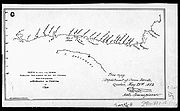
George Ramsay, 9th Earl of Dalhousie
General George Ramsay, 9th Earl of Dalhousie GCB , styled Lord Ramsay until 1787, was a Scottish soldier and colonial administrator...
, the current Governor General
Governor General of Canada
The Governor General of Canada is the federal viceregal representative of the Canadian monarch, Queen Elizabeth II...
, summered in William Henry. Through Kelly, Plessis (and Plessis' successor, Panet) learned of the governor's response to Jean-Jacques Lartigue
Jean-Jacques Lartigue
Jean-Jacques Lartigue was a Canadian Roman Catholic who served as the first Bishop of Montreal. He was the only son of a noted Montreal family...
's controversial 1820 promotion to auxiliary bishop of Montreal. Kelly was concerned by the governor's reaction; "I believe . . . we must not let ourselves be frightened by that man, that it will be necessary to bare our teeth. . . . We have a right to raise our voice and to make ourselves heard together at the foot of the throne. . . . Because we have been quiet spectators in politics it is thought that we feel nothing. It is quite clear that our enemies bear ill-will not only to the constitution of the country but also to its religion."
In spite of his strong words against the British colonial
Colonialism
Colonialism is the establishment, maintenance, acquisition and expansion of colonies in one territory by people from another territory. It is a process whereby the metropole claims sovereignty over the colony and the social structure, government, and economics of the colony are changed by...
governor, Kelly was no supporter of either the nationalist Parti Canadien
Parti canadien
The Parti canadien or Parti patriote was a political party in what is now Quebec founded by members of the liberal elite of Lower Canada at the beginning of the 19th century...
in charge of the House of Assembly
House of Assembly
House of Assembly is a name given to the legislature or lower house of a bicameral parliament. In some countries this may be at a subnational level....
. When that local government moved against the authority of the Catholic Church in Quebec, Kelly wrote to Panet, "It is time that a dike was erected against that body, ambitious and intoxicated by its success with the ministers... it is trying to invade everything and take to itself not only the legislative and ecclesiastical power, but also the executive
Executive (government)
Executive branch of Government is the part of government that has sole authority and responsibility for the daily administration of the state bureaucracy. The division of power into separate branches of government is central to the idea of the separation of powers.In many countries, the term...
and judicial power." Kelly also opposed Wolfred Nelson
Wolfred Nelson
Wolfred Nelson, was from 1854 to 1856 the mayor of Montreal, Quebec.- Biography :Nelson was born in Montreal the son of William Nelson, an immigrant to Colonial America from Newsham, North Yorkshire, England...
and the nationalists' attempts to build a monument to Louis Marcoux, a nationalist killed in the 1834 elections. As the Lower Canada Rebellion was beginning, Kelly urged Lartigue to speak out against violence; "at this time [your voice] would be much more powerful than all the English bayonets in the country... It would be too late to wait for the government to strike several blows from which the factious would certainly profit to stir up the countryside." Kelly's impression of Lartigue's influence may have been based on Kelly's own position as a powerful voice against outright rebellion in William Henry. In spite of this, Lord Dalhousie attacked Kelly for stirring up anti-government sentiment.
Kelly's involved himself in other disputes in William Henry. In 1839, he was suspected of helping Dr. George Holmes, who had killed Louis-Pascal-Achille Taché, to flee to the United States. Kelly, as a Catholic priest might be expected to, had counselled Holmes against committing suicide
Suicide
Suicide is the act of intentionally causing one's own death. Suicide is often committed out of despair or attributed to some underlying mental disorder, such as depression, bipolar disorder, schizophrenia, alcoholism, or drug abuse...
. Taché's wife, and Holmes' lover, Joséphine d’Estimauville, was related to Kelly by marriage, which may have encouraged his involvement in the case. Although d'Estimauville visited family in William Henry, and Holmes had briefly been a resident, the murder and the trial took place in Kamouraska
Kamouraska, Quebec
Kamouraska is a municipality on the south shore of the Saint Lawrence River in the Bas-Saint-Laurent region of Quebec, Canada. It is part of the Regional County Municipality of Kamouraska...
, and might not have otherwise called for Kelly's involvement. Kelly's testimony on d'Estimauville's behalf was at least partly responsible for her avoiding a sentence for complicity in the murder. In 1970, Anne Hébert
Anne Hébert
Anne Hébert, CC, OQ , was a Canadian author and poet. She is a descendant of famed French-Canadian historian Francois-Xavier Garneau, "and has carried on the family literary tradition spectacularly."...
wrote a book, Kamouraska, about the affair, which was made into a film
Film
A film, also called a movie or motion picture, is a series of still or moving images. It is produced by recording photographic images with cameras, or by creating images using animation techniques or visual effects...
in 1973 by Claude Jutra
Claude Jutra
Claude Jutra was a Canadian actor, film director and writer. The Prix Jutra are named in his honor because of his importance in Quebec cinema history. He was born and raised in Montreal, Quebec....
. Kelly appears in the film as a character, played by an uncredited actor.
Despite, or perhaps because of, Kelly's opposition to both the nationalists and the Protestant colonial government, Kelly was eulogized as "respected by all citizens, Catholic and Protestant".

